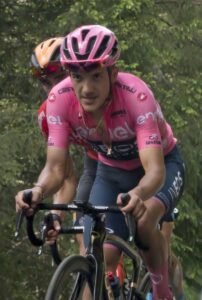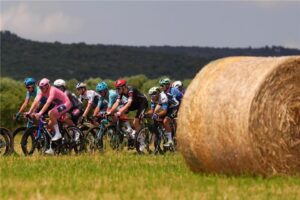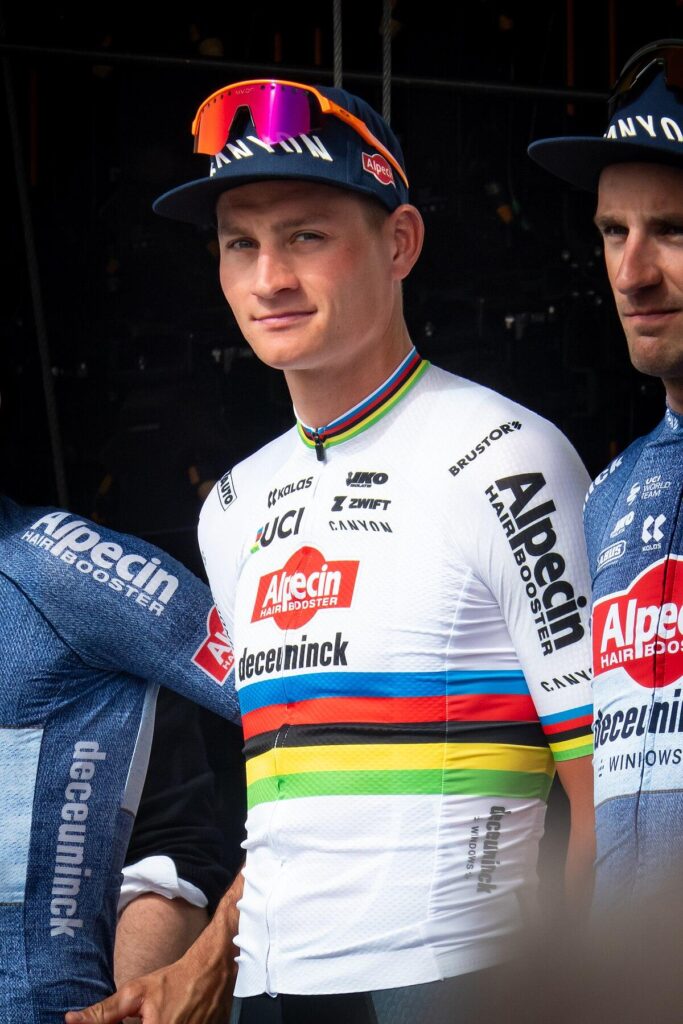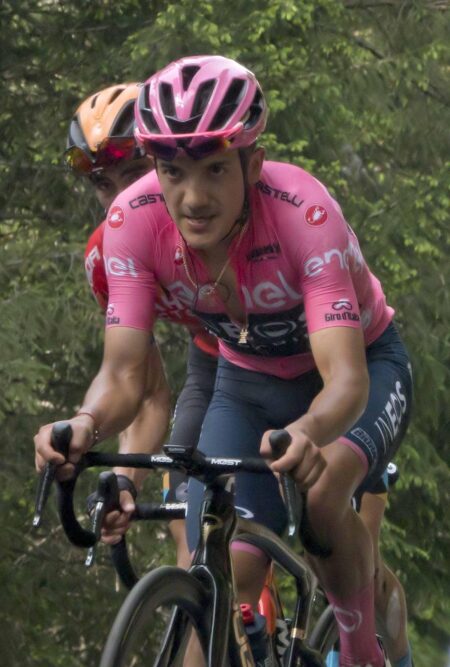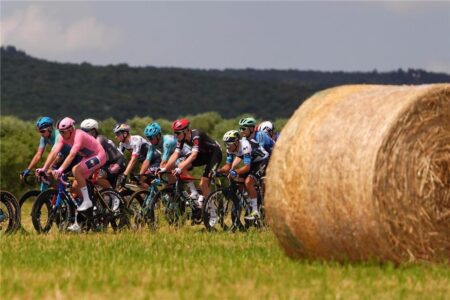In the world of professional cycling, few races capture the inventiveness and passion of fans like the Paris-Roubaix, often dubbed the ”Hell of the North” for its grueling cobblestone paths and brutal terrain. As this iconic one-day classic approaches, the speculation surrounding potential contenders intensifies. Among these is Tadej Pogačar, the young Slovenian rider who has quickly established himself as a force in the sport. Recently, cycling star Mathieu van der Poel voiced his assessment of Pogačar’s capabilities, suggesting that the reigning Tour de France champion should not be underestimated in the battle for victory at this legendary race. Van der Poel’s commentary offers insight into Pogačar’s unique skill set and endurance, framing him as a serious threat to the traditional favorites. In this article, we delve into the implications of van der Poel’s remarks and explore what makes Pogačar a formidable competitor as he gears up for one of cycling’s most challenging tests.
Mathieu van der Poel’s Respect for Tadej Pogačar’s Skills in Roubaix
Mathieu van der Poel’s admiration for Tadej Pogačar is not merely a gesture of sportsmanship but a recognition of the Slovenian cyclist’s exceptional prowess on varied terrains.Pogačar’s versatility is particularly noteworthy, as he has proven himself not only in the mountainous stages of Grand Tours but also in one-day races. this breadth of skill makes him a formidable contender for the Paris-Roubaix, a race notorious for its cobblestone sections and unpredictable weather. Van der Poel acknowledges that several factors contribute to a rider’s success in roubaix, including bike handling, stamina, and tactical acumen, all areas where Pogačar excels.
In Pogačar, van der Poel sees the potential to challenge the traditional titans of this grueling event. Evaluating Pogačar’s past performances, one can identify key characteristics that make him a serious threat:
- Exceptional Technical Skills: Quick adaptability to changing race conditions.
- Stamina: Ability to maintain high performance over long distances.
- Race Strategy: Keen tactical mind, capable of exploiting rivals’ weaknesses.
As the excitement builds for the upcoming Paris-Roubaix, van der Poel’s respect for Pogačar serves as a reminder of the dynamic nature of professional cycling, where emerging talents continually reshape the competitive landscape.
Analyzing Pogačar’s Tactical Strengths Ahead of Paris-Roubaix
Tadej Pogačar’s rise in the cycling world has been nothing short of meteoric, and with his eyes set on Paris-Roubaix, analyzing his tactical strengths becomes essential. Known for his amazing climbing abilities and versatility, Pogačar has shown both mental and physical resilience that could serve him well on the cobbled paths of Roubaix. His prowess in positioning during key moments allows him to navigate the peloton effectively, making him a formidable opponent in the thick of competitive racing.
His approach to racing combines several key attributes that enhance his chances of success:
- Technical skill: Pogačar exhibits remarkable handling on difficult terrains, a crucial advantage on the challenging cobblestones.
- Power and endurance: His ability to sustain high power outputs over long durations means he can tackle steep sections and recover quickly.
- Race intelligence: Pogačar possesses an innate tactical awareness that helps him forecast moves and react promptly, which is vital in the dynamic surroundings of Paris-Roubaix.
Moreover, his experience in one-day races, coupled with a strong team that supports him in navigating the nuanced demands of the parcours, assists Pogačar in building a robust race strategy. It’s crucial to note how he adapts his pacing and energy distribution throughout the race, allowing him to conserve strength for critical moments. by leveraging his deep understanding of competing cyclists, Pogačar can position himself strategically as the race unfolds. below is a comparison of his recent performances in similar races:
| Race | Placement | Key Tactics |
|---|---|---|
| Tour of Flanders | 2nd | Strong finish in the final kilometers, strategic positioning |
| Strade Bianche | 1st | Attacked on gravel sections, maintaining rhythm |
| Milano-San Remo | 3rd | Effective use of team support in the finale |
Historical Precedents: Young Climbers Exceling on Cobbles
Throughout cycling history, several young athletes have challenged the status quo, proving that age is merely a number when it comes to conquering the most demanding terrains. Notable examples include Peter Sagan, who claimed victory at the age of 23 in the 2013 World Championships, and Julian Alaphilippe, who stunned the cycling world by winning the 2019 World Championship at just 26. These moments not only underscore the potential of youthful exuberance but also demonstrate how younger riders are increasingly adept at tackling the intimidating cobbles of races like Paris-Roubaix. Such accomplishments create a narrative that resonates with an audience eager to see the next generation rise to prominence.
As Tadej Pogačar gears up for his potential foray into the treacherous cobblestones, comparisons to previous young legends are inevitable. His climbing prowess and race strategy suggest that he may very well follow in their footsteps. Noteworthy attributes that may play in his favor include:
- Versatility: Pogačar’s ability to adapt across disciplines, from Grand Tours to one-day classics.
- Experience: Already a two-time Tour de France champion, his racing IQ surpasses many peers.
- Physical Strength: His climbing and sprinting capabilities make him a formidable contender in mixed terrains.
The combination of these factors positions him as a serious contender for future successes on cobbled roads, placing him alongside the esteemed ranks of former young champions who ventured into uncharted territories and reshaped their legacies.
Strategies for Pogačar to Conquer the paris-Roubaix Challenge
To maximize his chances at the Paris-Roubaix, Tadej Pogačar must implement a multifaceted strategy that leverages both his innate cycling talent and his adaptability to the grueling terrain. First and foremost, readiness will be key.This includes familiarizing himself with the legendary cobbled sections, known as secteurs pavés, which can be treacherous even for the most seasoned riders. Prior training camps on these iconic roads will allow him to adjust his bike handling skills and learn how to conserve energy while navigating the rough surfaces. Moreover, a tailored nutrition plan that focuses on endurance and recovery will ensure that Pogačar maintains peak performance throughout the race.
In addition to physical prowess,tactical acumen will play an essential role in Pogačar’s quest for victory. He should consider the following strategic elements during the race:
- positioning: Staying in the top echelon of the peloton, especially before entering critical sectors, will help him avoid crashes and conserve energy.
- Alliances: Forming temporary alliances with other strong riders can lead to shared pacing, providing necessary slips as they tackle the most challenging parts of the course.
- Pacing: Recognizing when to push hard, such as on the sections leading up to known cobbles, and when to recover will be crucial.
by harmonizing his training regimen with a thoughtful tactical approach,pogačar can position himself not only as a contender but as a likely victor in one of cycling’s most challenging events.
To Wrap It Up
Mathieu van der Poel’s acknowledgment of Tadej Pogačar as a formidable contender for the Paris-Roubaix highlights the evolving landscape of professional cycling. With both riders boasting exceptional skills and impressive achievements,the potential showdown between them could redefine the dynamics of this iconic race.As the cycling community eagerly anticipates the event, Pogačar’s versatility and recent performances make him a serious threat to the established elite.As we approach Paris-Roubaix, all eyes will be on these two athletes, ready to witness weather Pogačar can rise to the occasion and claim victory on the challenging cobblestones.

